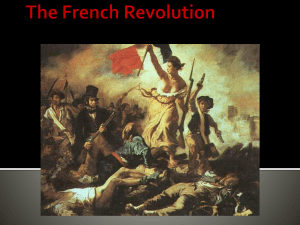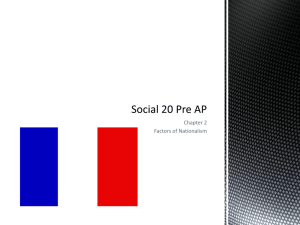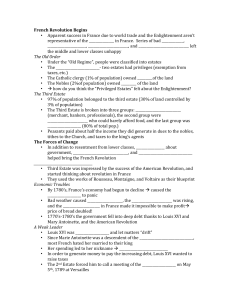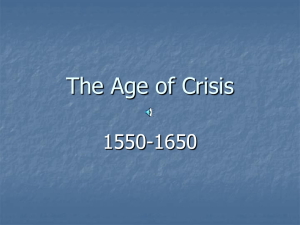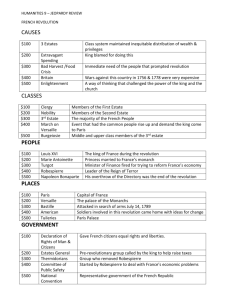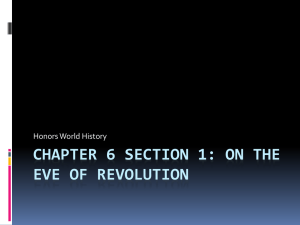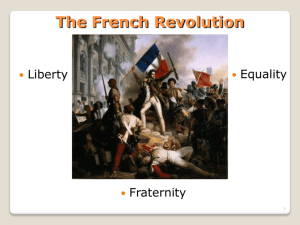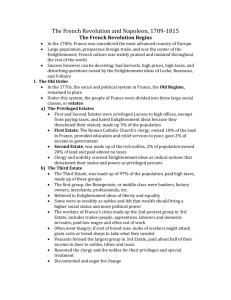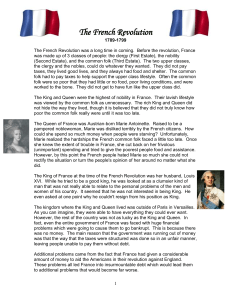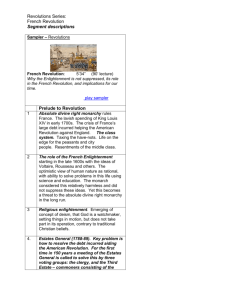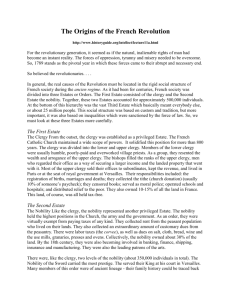Study Guide Quiz Chapter 23 – 1, 2 (The French Revolution) The
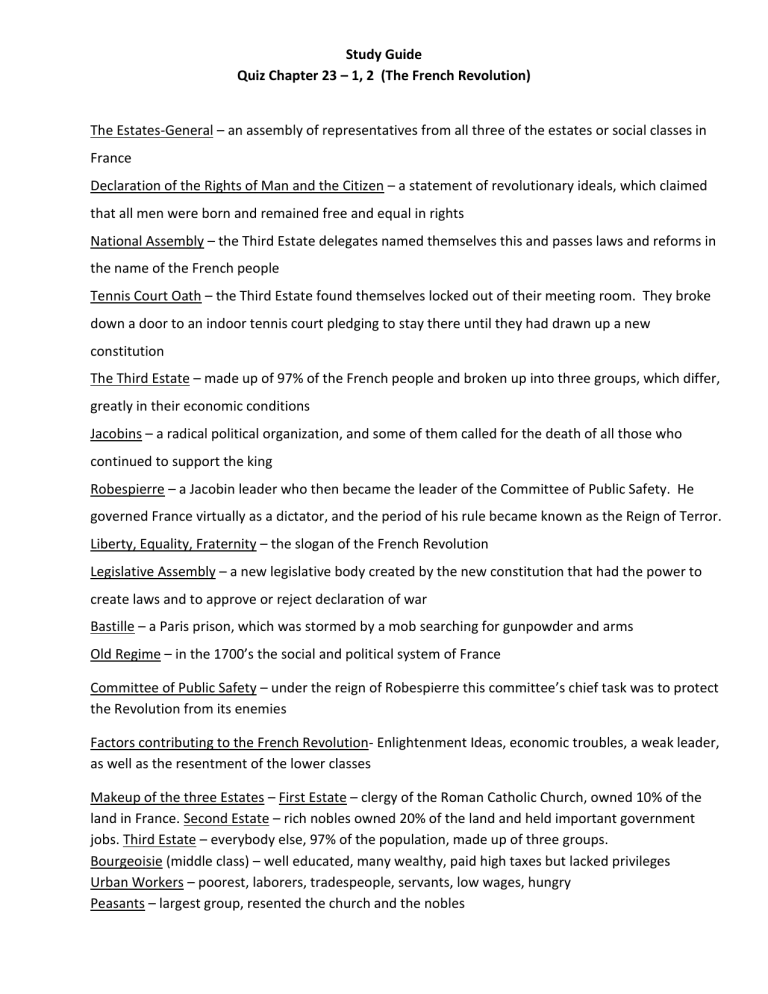
Study Guide
Quiz Chapter 23 – 1, 2 (The French Revolution)
The Estates-General – an assembly of representatives from all three of the estates or social classes in
France
Declaration of the Rights of Man and the Citizen – a statement of revolutionary ideals, which claimed that all men were born and remained free and equal in rights
National Assembly – the Third Estate delegates named themselves this and passes laws and reforms in the name of the French people
Tennis Court Oath – the Third Estate found themselves locked out of their meeting room. They broke down a door to an indoor tennis court pledging to stay there until they had drawn up a new constitution
The Third Estate – made up of 97% of the French people and broken up into three groups, which differ, greatly in their economic conditions
Jacobins – a radical political organization, and some of them called for the death of all those who continued to support the king
Robespierre – a Jacobin leader who then became the leader of the Committee of Public Safety. He governed France virtually as a dictator, and the period of his rule became known as the Reign of Terror.
Liberty, Equality, Fraternity – the slogan of the French Revolution
Legislative Assembly – a new legislative body created by the new constitution that had the power to create laws and to approve or reject declaration of war
Bastille – a Paris prison, which was stormed by a mob searching for gunpowder and arms
Old Regime – in the 1700’s the social and political system of France
Committee of Public Safety – under the reign of Robespierre this committee’s chief task was to protect the Revolution from its enemies
Factors contributing to the French Revolution- Enlightenment Ideas, economic troubles, a weak leader, as well as the resentment of the lower classes
Makeup of the three Estates – First Estate – clergy of the Roman Catholic Church, owned 10% of the land in France. Second Estate – rich nobles owned 20% of the land and held important government jobs. Third Estate – everybody else, 97% of the population, made up of three groups.
Bourgeoisie (middle class) – well educated, many wealthy, paid high taxes but lacked privileges
Urban Workers – poorest, laborers, tradespeople, servants, low wages, hungry
Peasants – largest group, resented the church and the nobles
Be able to describe three of these events and why were they were significant to the Revolution:
Formation of the National Assembly – June 17 th , 1789, 3rd estate name themselves the
National Assembly, pass laws and reforms in the name of the French people, Significance: essentially proclaimed the end of the absolute monarchy in France
Storming of the Bastille – Rumors spread that Louis was using military to break up the National
Assembly, and those foreign troops were coming to Paris to massacre French citizens. People began to gather weapons. July 14 th , 1789, a mob stormed the Bastille (prison where many political prisoners were held and where they believed weapons were stored). Mob overwhelmed guards and seized control of the building, killing the commander and several guards. Significance: This was a symbolic act of revolution and is still celebrated in France as Bastille Day.
The Great Fear and the Women’s March on Versailles – The Great Fear was a rebellion spread from Paris to the countryside, rumors that nobles were hiring outlaws to terrorize peasants set off a panic known as the Great Fear. Peasants began attacking nobles and manors. This shows that the revolution had spread from the city to the countryside. The Women’s March on Versailles – was in
October 1789, a riot over the rising price of bread (a staple). With weapons like knives and axes, they marched to Versailles to demand that the National Assembly do something about the rising price of bread, they then turned on the king and queen. They demanded that Louis and his family return to
Paris with them and they did. Significance of both: two different groups (women and peasants) added their revolts to the revolution.
The takeover of the Church by the National Assembly – The National Assembly took over the
Church lands and declared that Church officials and priests were to be elected and paid as state officials. Thus the Catholic Church lost both its land and its political independence. The reason for the
Assembly’s actions was largely economic. Proceeds from the sale of Church lands helped pay off
France’s huge debt. Significance: church lost its power and peasants, who remained loyal to the church, were turned against the revolution.
The Reign of Terror – During the year after Robespierre became leader of the Committee of
Public Safety he governed France virtually as a dictator. Under Robespierre’s leadership the committee often had these “enemies” tried in the morning and guillotined in the afternoon. He justified his use of terror by suggesting that it enabled French citizens to remain true to the ideals of the Revolution.
Significance: eventually ended the revolution and resulted in a new government.


